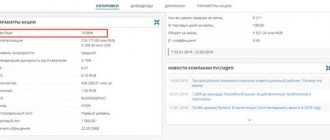How does controlling interest work?
As you already know from the article about shares, each issued share gives the investor the right to participate in the board of directors. That is, you can come there and vote. The more shares you hold, the stronger your vote.
Now imagine that the company issued 100 shares, and you bought back 51 of them. You come to the board of directors, and some issue is brought up for discussion. All investors are against it, but you are in favor.
What happens? 49 percent of the votes were against and 51 percent were in favor. As a result, you seem to single-handedly make the decision that you consider correct. A controlling interest allows you to manage the company as you see fit. Naturally, you will try to develop it so that the purchased shares bring you good passive income, and do not just lie there as a dead weight.
What is a share package and why is it needed?
A “block of shares” (PA) is a fixed volume of securities acquired by one person (shareholder). The rights that the shareholder has depend on its size. If the size of the package is small, this may include the right to vote at meetings and to receive dividends. Owning a significant share capital of any joint stock company, you can already really manage it.
What is the difference between a stock and a bond?
To avoid confusion, let's remember the differences between a stock and a bond.
Shares are equity securities that confirm the right to own part of a joint stock company (JSC). They give the shareholder rights, such as receiving dividends. The size of dividends depends entirely on the financial health of the company and the decision made by shareholders on its distribution.
Hurry up to take advantage of the doubling of the tax deduction until December 31, 2022.
Bonds are debt securities that give the investor the right to receive a specified amount over a specified period of time. That is, by purchasing bonds, you are lending to a joint stock company. The income on bonds is fixed in advance in the form of a premium or discount.
A controlling stake is not always 50% + 1 share
Look, to manage a company, you don’t have to buy out 50% of its shares. Not all investors come to the shareholders meeting. Additionally, not all investors will vote differently than you. Many will agree with you, so you can easily achieve your goals and approve the decisions that you consider correct.
In real life, 20-40% of all issued shares is enough for “control”. But unless you have 50% + 1 share, there is still a risk that something will go contrary to your expectations.
Types of packages
And now I propose to move on to defining the types of PA, consider what advantages they provide and what limitations they have.
Control
A controlling interest (CPS) is a certain number of securities issued by a company that are owned by one person (both an individual and a legal entity). A controlling PA gives such a shareholder the right to solely manage the joint stock company on many issues.
What share of shares must be owned for a controlling stake?
According to the classics, for your PA to become a controlling interest, the share owned by you must be at least 50% plus 1 share. In this situation, a conflict of interest is excluded: this volume is available to only one shareholder. In practice, the owner of the controlling PA may have less than 50 percent, because his stake, even in this case, is the largest among all shareholders of the company.
What determines its size?
The size of the controlling PA depends on the total number of shareholders. If the shares are very “scattered”, i.e. are held by a very large number of people and firms, then the largest volume among those available becomes control. It was found that 10% gave their owner control over the joint-stock company.
Who owns the CPA
The analysis shows that a controlling stake is often owned by one of the company’s founders or members of their families, sometimes these are top managers of the enterprise. In the largest companies in Russia, on which, figuratively speaking, the economy rests, you can often find that government agencies (government or relevant ministries) have a control PA.
What opportunities does owning a CPA provide?
The owner of a company's control PA can make independent decisions on a number of issues:
- Current activity;
- development strategy;
- appointment of management staff.
When the controlling interest is 75% + 1, its owner has complete control of the enterprise. In this case, it is impossible to block the decisions of the meeting, since there is no blocking package.
Advantages and disadvantages
Owning a control PA has a number of advantages:
- Sole management of the joint stock company (with the exception of a number of issues referred by law to the competence of ¾ of the total number of votes).
- Disposal of income (including making decisions on dividend payments).
- Determining prospects and strategies for long-term development.
I would consider the disadvantages of a controlling stake to be high risk and serious responsibility. Sole management is riskier and requires significantly more effort.
Blocking
The blocking package contains enough shares so that you can block or postpone decisions made at the general meeting of shareholders. Its size is 25%, but it can be much smaller.
Let me give you an example. Among the shareholders of the domestic energy sector there is no owner of the controlling PA, but there is JSC Rosneftegaz, the owner of 27.63% - a majority stake. The next largest package is INTER RAO Capital, it has 19 percent and, in this case, it is a blocking stake.
Minority
With a minority stake, you will not be able to have a significant influence on the company’s activities, but in general you are a full-fledged shareholder: you can vote at meetings, request information about the company’s activities, and receive dividends. In the classical sense, the minority stake is 1%.
Given the insignificant volumes of its influence, the implementation of the rights of minority shareholders sometimes hangs in the air. For example, if an enterprise is liquidated and has little property, then by the time the priority reaches the shareholders, they may not receive anything. In such a case, the law provides for the right of shareholders to file a lawsuit against the management team in order to compensate for the damage caused.
However, minority shareholders have ways to influence the owners of large PAs if the latter pursue policies that infringe on their rights:
- Contact different inspection bodies. Possessing insider (internal) information about the enterprise, an offended shareholder can tell a lot of useful things.
- Contact the Ministry of Internal Affairs or the prosecutor's office with a statement that the management of the enterprise is violating the law, for example, exceeding their powers.
- File a lawsuit to declare an agreement to purchase a large PA illegal.
- Submit an application to the Antimonopoly Committee. All transactions for the acquisition of PA of 25% or more must be approved by AMK, otherwise the company faces a serious fine.
- File a lawsuit with any pretext for violation of the rights of a minority shareholder and demand a ban on holding a meeting of shareholders.
Even if you own a minor PA, you can defend your rights. True, these same methods, using unscrupulous minority shareholders, are often used by competitors in order to absorb the enterprise they like.
Majoritarian
A majority stake gives the owner the right to control the JSC if there is no owner of the controlling PA. Let me give you an example. PJSC Gazprom has so many shareholders that no one owns the controlling shareholder. Therefore, at meetings, the majority belongs to the majority stake of 38.373%, which is owned by the state through Rosimushchestvo.
Other types of packets, except control
“Power” over a company, to one degree or another, can be given by other types of packages, not just controlling ones. Let's look at them.
Blocking
This is when one person owns 25% of the company's shares. They allow him to stop the implementation of a decision or postpone it. If you have a controlling stake, then it is, as it were, automatically blocking.
Majoritarian
The opportunity to obtain a majority stake will only be provided that no one owns a controlling stake. That is, not a single investor has more than fifty percent of the securities. The majority portfolio will be held by the one who owns more shares compared to the others.
This is exactly the situation when one person has 20-40 percent of the shares. He can seriously influence the development of the business, but if 60% of all shareholders are against some decision, and he alone, with 40%, is in favor, the strength of the majority stake will still not be enough to approve any decision.
Minority
These are all the other “sets”. Minority stakes will include stakes that are not majority, much less controlling.
Types of shares of a joint stock company
There are two types of shares of any company in the form of a joint stock company: ordinary and preferred. I'll tell you more.
Ordinary
A person who owns ordinary securities of a joint stock company is a full shareholder with the rights inherent in this status:
- Voices at meetings.
- To receive income in the form of dividends. However, you will receive them only if the company is profitable and the majority of votes at the meeting were cast in favor of the decision to pay them.
- For part of the property upon liquidation of the joint-stock company. True, the owners exercise this right last, when all obligations to other creditors have been fulfilled.
Privileged
Preferred shares provide their owners with a stable income in the form of a fixed dividend. And in the event of bankruptcy of an enterprise, such shareholders have a priority right to part of the property over ordinary ones. But such securities do not provide voting rights.
What not to do even if you have a controlling stake
Look, in the Russian Federation there are several restrictions that even keep owners of controlling stakes in check. For example, here are decisions that require the support of ¾ of all shareholders to implement.
- Closing a business. If the Ministry of Finance has a 52% stake in Sberbank, this does not mean that the ministry can take and close Sberbank. This is a very serious decision that only 75 percent of all shareholders can make.
- Merger of a company with another organization. This is something close to closure. If companies merge, it means there will be fundamental changes in development strategy and in everything in general.
- New issue of securities of any type (stocks or bonds).
- Changing the size of the authorized capital.
- Making very expensive deals. Very expensive are those whose amounts exceed 50% of the cost of the entire business.
In short, it is impossible to take any very serious steps even if you have a controlling stake. To implement them, we need the support of other shareholders.
But there is a way to get around this limitation. We need to buy out 75% of the shares and one more. Then the person will have complete control over the company.
How to find out how many shares I have
If you do not know which PA you own, you can request this information directly from the company or from the registrar that maintains records of the company's securities.
Please note that such information is provided personally to the owner or by power of attorney, properly executed from a legal point of view. That is, you cannot simply contact the registrar with a request about the size of the shareholding without being a shareholder of the company. They will simply refuse you.
I hope you have understood the features of different PA companies and now know which one is right for you if you are planning to start investing. The main thing is to approach this issue carefully and realistically assess your capabilities.
Subscribe to my updates and be sure to share links to the latest posts with your friends on social networks!
Do you need a controlling interest?
If you become such a great investor that you can purchase shares in the amount of controlling stakes, think about whether you need it. You should purchase such volumes of shares in one and only case - when you know what to do with the business, how to develop it.
So Warren Buffett quietly bought more than half of the shares of Berkshire Hathaway, a company that at that time was just involved in textiles. And what did he do? He turned it into the largest investment holding, which now invests money in everything. But this is Buffett. And you?
When the Russian government bought out Sberbank, it also knew well what to do with it. Or what can be done with it. Did you know this?
Difference between control and blocking packets
The person who owns the controlling stake is automatically the owner of the blocking stake. The holder of a blocking package can veto decisions of the remaining members of the JSC. The owner of a controlling stake has the opportunity to both block decisions of the remaining shareholders and resolve a large number of issues related to the management of the joint-stock company: payment of dividends, choice of development direction, etc. However, a number of issues related to the management of the joint-stock company require more than ¾ of the votes. This:
- Liquidation of company;
- merger, reorganization, change of status;
- reduction of the authorized capital by reducing the par value of shares;
- increase the authorized capital;
- establishing the price of securities for the upcoming issue;
- purchase of own shares placed on the stock market;
- planning a major transaction whose value exceeds half of the JSC’s assets.
Is it worth buying out small companies?
Some novice investors think that they only need to buy a controlling stake in large companies. This is wrong. A small business can be a very profitable investment option, but only if you can develop it.
When a company is not yet developed, its shares are cheap. If a company has issued shares but has not demonstrated sustainable growth and profitability, investors will be eager to get rid of these shares. Consequently, you will have the opportunity to buy out a controlling stake without much difficulty and for a low fee.
Then, if you have knowledge and experience, you can begin to develop the company, tell its management what and how to do. In short, manage everything and everyone, lead your “brainchild” to prosperity.
Share repurchase programs
Often, if a company believes that its shares are undervalued, it will launch a buyback program, buying back its own shares. In an effort to increase the market value of the remaining shares and increase overall earnings per share, a company may reduce the number of shares outstanding by repurchasing or repurchasing those shares, thereby removing them from the public market.
Take Apple, Inc., for example, whose outstanding securities have significant institutional ownership of approximately 62%. In March 2012, Apple announced a buyback program worth more than $90 billion several times. According to the New York Times, "[the buyback's] main purpose will be to address shareholder dilution that will occur as a result of future Apple employee equity grants and stock purchase programs." Thanks to its huge cash reserves, Apple was able to aggressively repurchase its shares, thereby reducing the number of shares outstanding, increasing its earnings per share.
As of December 2015, Apple's market capitalization is $869.60 billion and its shares outstanding are 5.18 billion. Since the buyback program was announced, the stock price has risen nearly $170.
On the contrary, in May 2015, BlackBerry, Ltd. announced a plan to repurchase 12 million of its outstanding shares to boost stock earnings. BlackBerry plans to buy back 2.6% of its more than 500 million shares outstanding as a capital boost. Unlike Apple, whose excessive cash flow allows the company to spend extravagantly to generate profits in the future, BlackBerry's slowing growth suggests it is repurchasing its outstanding shares in preparation for a cancellation.
Useful materials on the topic
You probably want to learn how to invest, but don't know where to start yet. In that case, I will recommend you some good materials.
I started studying investments with the course “Personal Finance and Investments”. This is like the very first step, the very basics. The teacher of this course (investor Sergey Spirin) explains the difference between the most popular investment instruments, why you need to invest and not speculate, and teaches you how to correctly build a portfolio taking into account risk and expected profitability.
The course is taught in video format. After each video there are tests to reinforce the material.
Vasily Blinov, who created this site, studies investing in the City of Investors. This project has a lot of materials, both paid and free. You can start with these three free books. Download them and read:
- How to become financially independent in 1 year.
- 5 ways to effectively invest 1000+ rubles.
- 6 steps to financial security.
Everything is written in simple and understandable words.
The next step is to study courses and webinars on investments. Start with these two free ones:
- Investment portfolio for $100 per month. At the webinar, the teacher explains how investment portfolios are created in principle and how to properly start passive investing. You will learn what criteria you need to use to choose brokers (intermediaries who will carry out your trading instructions, buy and sell shares), how to assemble portfolios that are resistant to economic cycles.
- Investments without a million in your pocket - you will learn that you can start investing with very small amounts. Even with 500-1000 rubles. It is not at all difficult and not as “ineffective” as it seems at first glance.
I strongly advise you to sign up for both of these webinars and watch them, evaluate the teaching style and the quality of the material. If you like it, go to these paid courses:
- Passive income incubator - the course is aimed at buying shares. It’s about how to choose securities that will generate stable passive income, how to invest in stocks and not worry about fluctuations in their prices at all.
- Passive income on the machine - different financial instruments are considered here, not just stocks. You will have a systematic idea of what assets you can acquire in order to become richer and richer every year.
- Extremely profitable investments in IPOs are a course on purchasing shares of companies that have just entered the stock exchange. That is, the company received permission to issue shares and sell them to investors on the financial market. The authors share cool life hacks and recommendations with the audience. After the course, you will be able to confidently move from theory to investment practice.
You can also watch recordings of free webinars on investing from AkBars Bank. Here is the first webinar, then you will find your way through the playlists:
That's probably all. If you are more attracted to the possibilities of speculative earnings, here is my selection of trading courses. I’m starting it with courses on trading on the foreign exchange market, because they are completely free. Next comes the stock and derivatives markets.
But I don't think speculation can be a source of stable income. In the short term, they can enrich you, but you will never get stability from them.
Popular questions about outstanding shares
What shares are outstanding?
Shares outstanding are shares owned by a company's shareholders on the open market. Along with individual shareholders, this includes restricted stock held by company officers and institutional investors. They are listed as fixed capital on the company's balance sheet.
What is the difference between outstanding shares and free float?
While outstanding shares are shares of a company that include restricted shares and institutional shares, floating shares or free float are specifically shares available for trading. Current stock is calculated by subtracting shares outstanding minus restricted stock. Restricted shares are shares held by company insiders, employees and key shareholders that are subject to temporary restrictions and therefore cannot be sold.
How does a stock split affect shares outstanding?
Typically, a stock split occurs when a company seeks to lower the price of its shares. When this happens, the company's number of outstanding shares increases and, as a result, the level of liquidity increases. In contrast, a reverse stock split occurs when a company seeks to increase the price of its shares. Often a company will do this to meet listing requirements, which often require a minimum share price.
How is the cost of PA assessed?
Valuation work is usually carried out based on stock exchange quotes and company capitalization. If the block of shares is large, then bilateral transactions are carried out with the involvement of experts.
Independent experts charge a considerable amount for their work, but at the same time guarantee independence and impartiality. Basic methods of work of appraisers:
- Expensive . The expert analyzes all the costs that were spent on the construction of the company's assets.
- Comparative . The appraiser looks for a similar company in size, volume of products or services and calculates its value; perhaps this information is available in open sources.
- Production . The expert calculates the generation of cash income and profit of the company, and based on this makes a conclusion about the value of the company.
For all three methods, there are mathematical formulas and calculation methods.











